Travelling up the lane and into the yard, from a quick assessment there’s no reason to think Cloughbane is anything other than a regular family farm.
It’s only the signs and a small carpark that give the game away.
You see, as well as being a working family farm, Cloughbane has a couple more strings to its bow. Namely, a farm shop selling their meat and also a pre-packed pie and ready meal range.
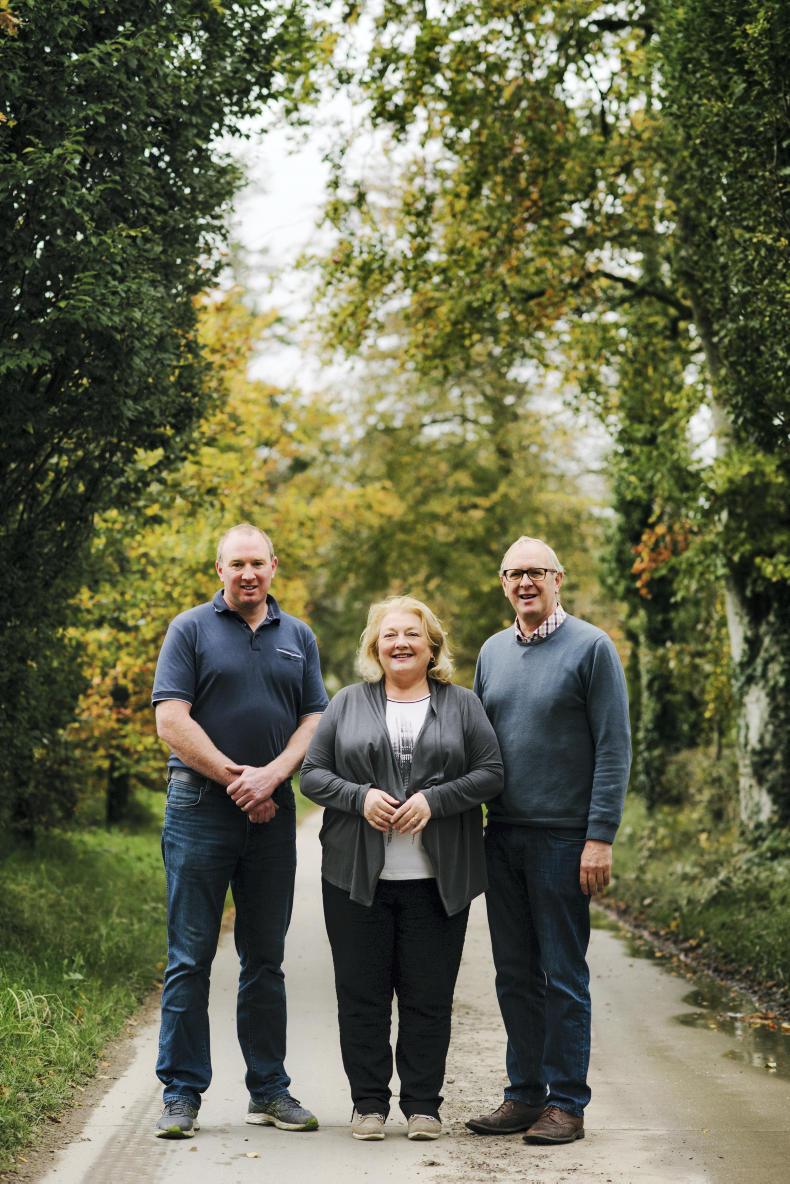
Robert, Lorna and Sam Robinson. \ Sarah Fyffe
The yard is lined with both yellow and stone farm buildings. On one side the yellow front makes up the farm shop, converted from a sheep shed.
Behind the stone is a whole processing unit for the ready meals, this was once a byer.
The family behind this enterprise is the Robinsons. Husband-and-wife team Sam and Lorna started up the business and now their sons Robert and Richard are also very involved. Lorna is the managing director and from a mixed farm herself. She and Sam met through the Young Farmers’ Clubs of Ulster (YFCU).
I previously had a job in sales, so again I was able to use a lot of that as this business grew
Located between Cookstown and Dungannon in Co Tyrone, Cloughbane Farmshop is on Sam’s home farm. Prior to diversifying they had 700 sheep, beef cattle and free-range hens.
At this time, as well as working on farm, Lorna was doing a degree in marketing and finance.
“I previously had a job in sales, so again I was able to use a lot of that as this business grew,” says Lorna.
“Just over 20 years ago, I was ill and I was out of work. I had a serious illness for a while and I kind of lost my nerve about going back into sales.
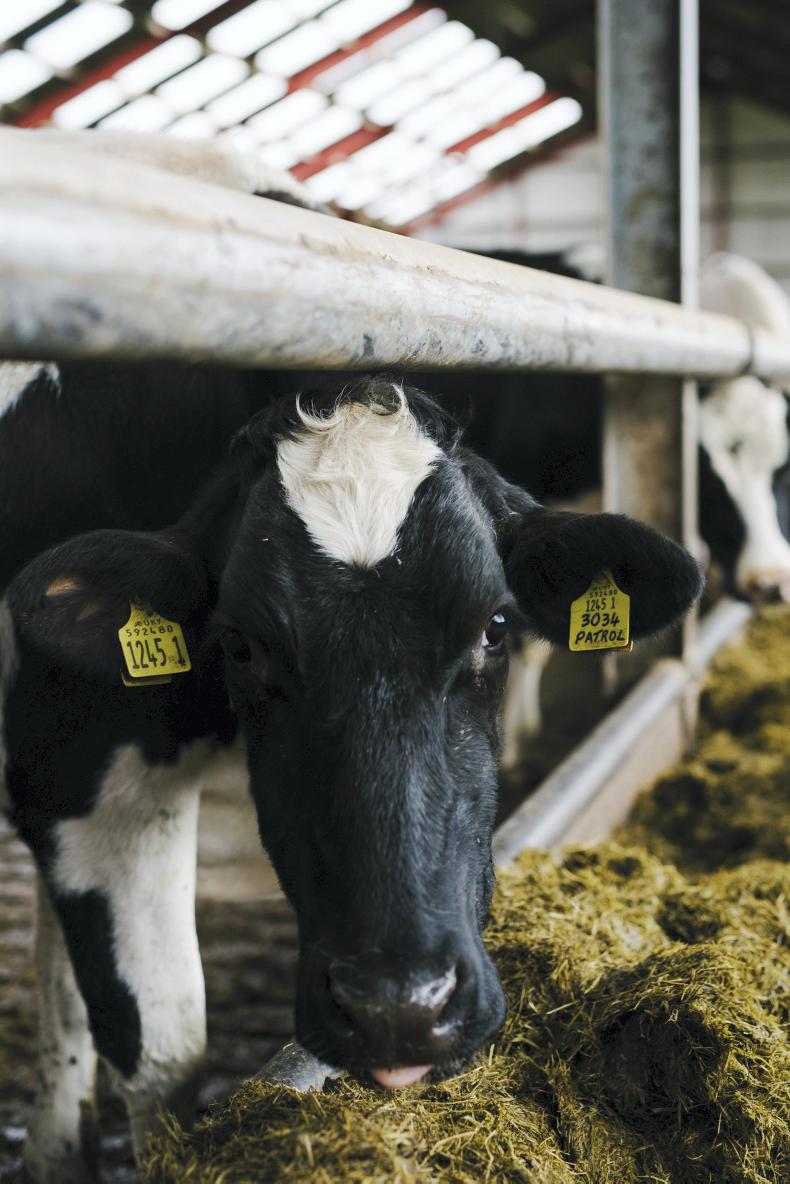
“At the time when this all started up I was working on the farm full time with the hens and I was helping out with everything else.”
In 2002, Lorna was asked if the family would become founding members of Dungannon Farmers’ Market. This might have appeared to be a small step at the time, but it turned out to be the catalyst for what’s now an international agri food business.
As the farmers’ market grew, so did Lorna’s confidence. She was involved in a lot of the promotion for the market, for example doing write-ups for the paper, on which she received great feedback.
Initially we didn’t even think of a farm shop, we just wanted a cutting room
At the once monthly market the Robinsons sold beef and lamb from their farm which was slaughtered in a local abattoir. This proved popular with customers, who wanted to buy their meat more often. 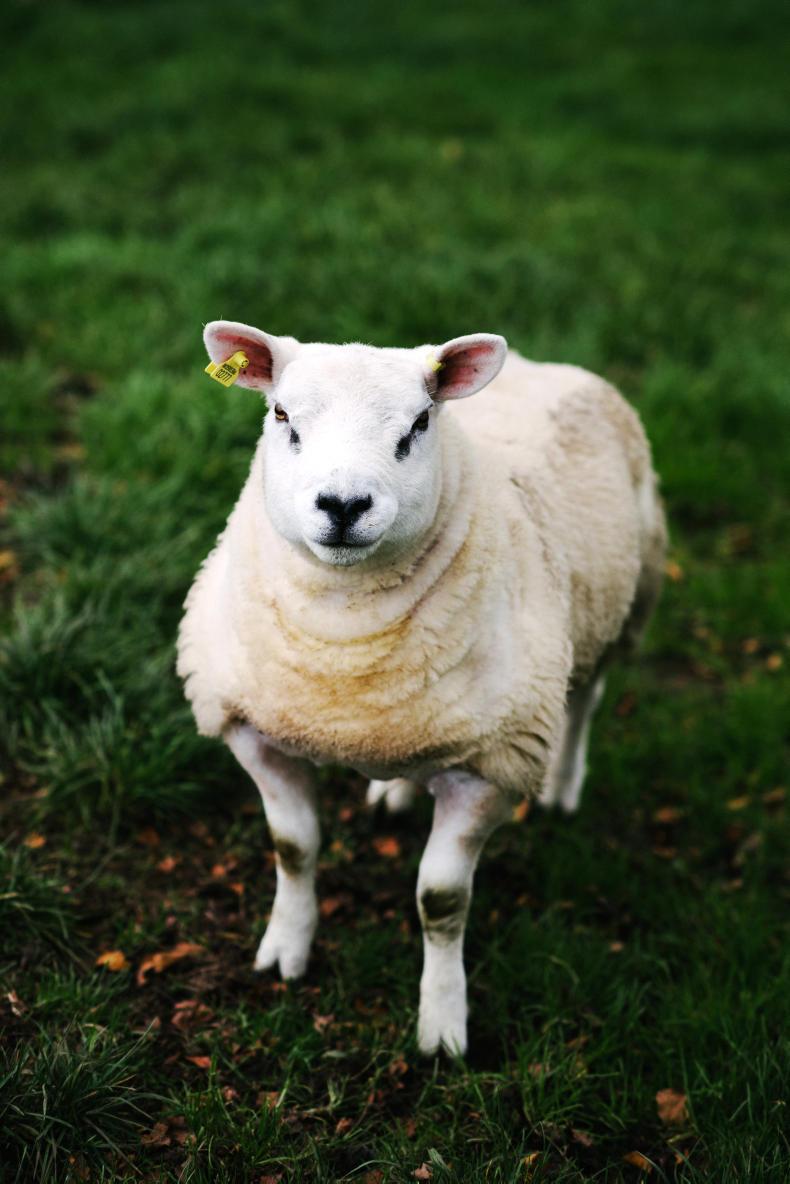
“Initially we didn’t even think of a farm shop, we just wanted a cutting room. We were buying secondhand equipment from a local butcher. He had this stuff in his garage and said, ‘Lorna, there’s a wee serve-over.
“It’s only going to sit there until it rots, take it away if it’s any good to ye’. We asked the environmental health officer (EHO) could we open a shop here? He said, ‘Look, you have all the standards necessary’.
“At the farmers’ market we handed out leaflets saying we are now open on Thursday, Friday and Saturday. Initially the butcher would come, bone-down the whole animal and put labels on the meat.
“I would come out and serve the customers. We would have had frying steak and braising steak.
“I often wonder did people take the wrong thing home when the label fell off,” laughs Lorna of her first foray in retail.
Expansion on the horizon
The farm shop proved to be busy and by 2006 was open full time. However, there was one small issue, it was really only the premium cuts customers were buying.
“Our unique selling point was 28 days matured beef, because of that people were coming from far and wide to buy steaks and the more expensive cuts.
“We were left with a lot of the cheaper cuts, but the lovely ones, that if they’re slow cooked, are full of flavour.
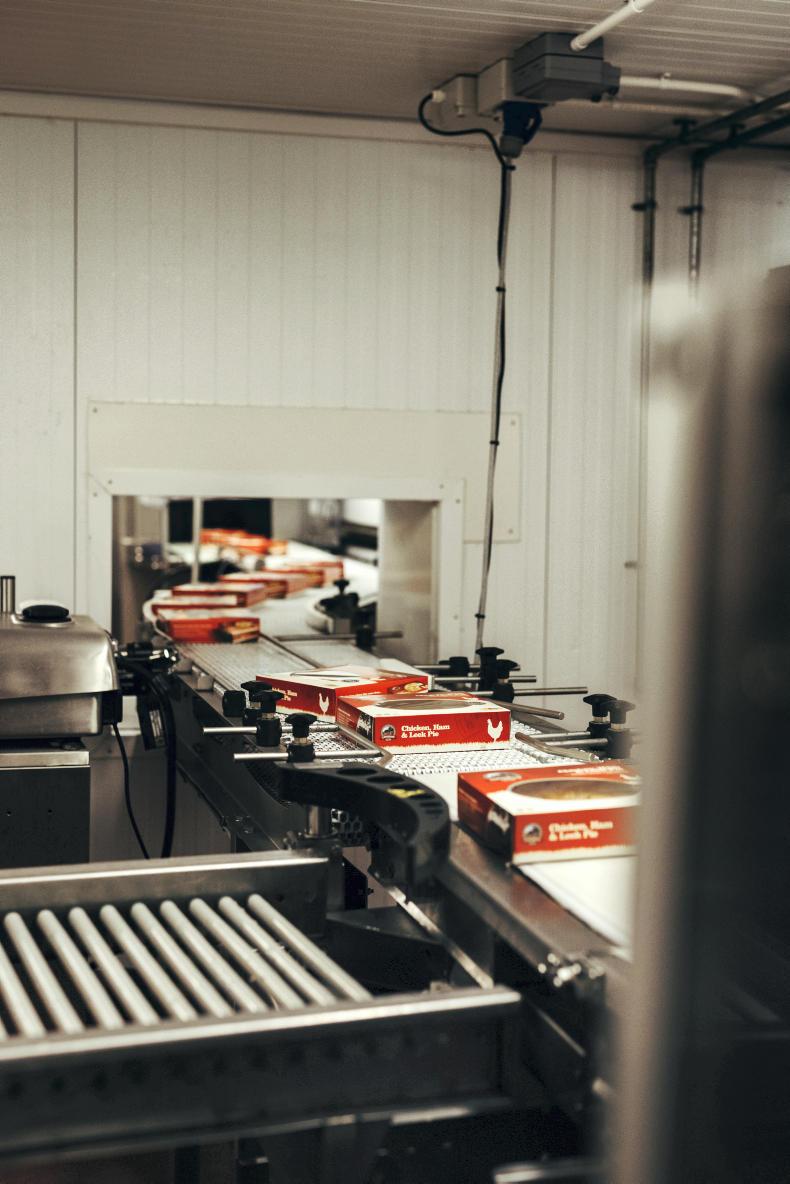
“We thought, what are we going to do with this? So I literally started to make some pies in our kitchen [their house is in the same yard as the shop] and sold them in the farm shop. Then local stores came and said, ‘Can you do this for us?’ Really, that was how the cooked food end of it was born.”
As the cooked range began to expand into ready meals such as cottage pies and beef dinners, it became unsustainable to only use meat from the Robinsons’ farm. Now they buy in beef from Ireland and the UK.
In and around 2008 they started selling these meals in supermarkets. Now they’re stocked in Asda, Sainsbury’s, Tesco and SuperValu to name but a few.
Interestingly, Lorna credits the Balmoral Show as the platform where the supermarkets initially became aware of their products.
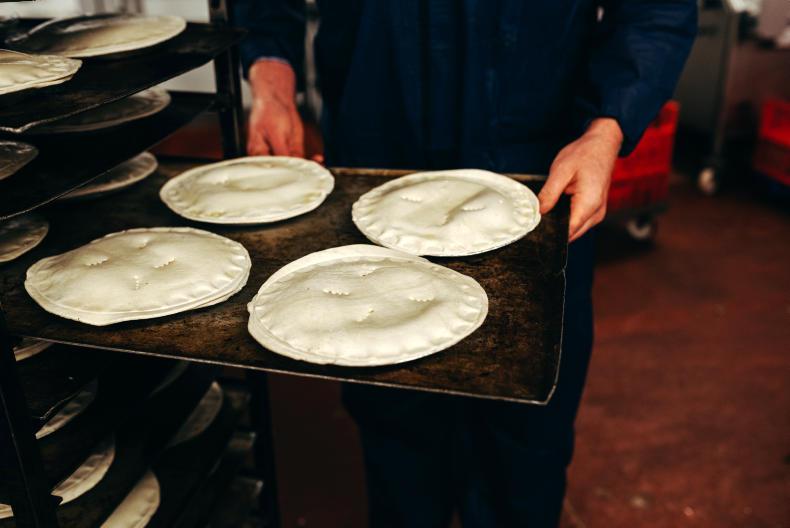
“Seeing our stuff on supermarket shelves was totally amazing, because not in a million years if you had asked me 20 years ago would I have thought it was possible. It was all so unintentional.”
The sauces used in the meals are made from scratch. The only thing bought in is pastry from Dublin.
Lorna’s son Robert gives us a tour of the processing unit as people are busy at work. Across the business they now employ about 50 staff.
We follow the pies from raw ingredients to cooking the meat and vegetable filling in huge vats to baking and packaging. Along the way, we change into various colour-coordinated suits, shoes and hair nets – don’t forget the hand sanitising – as Robert seriously stresses the importance of these quality controls.
Chatting to Lorna afterwards in one of their converted farm building offices, there are a whole host of awards hung on the wall behind her. From Great Taste (they got three stars for their fillet steak) to agri food business of the year and more. 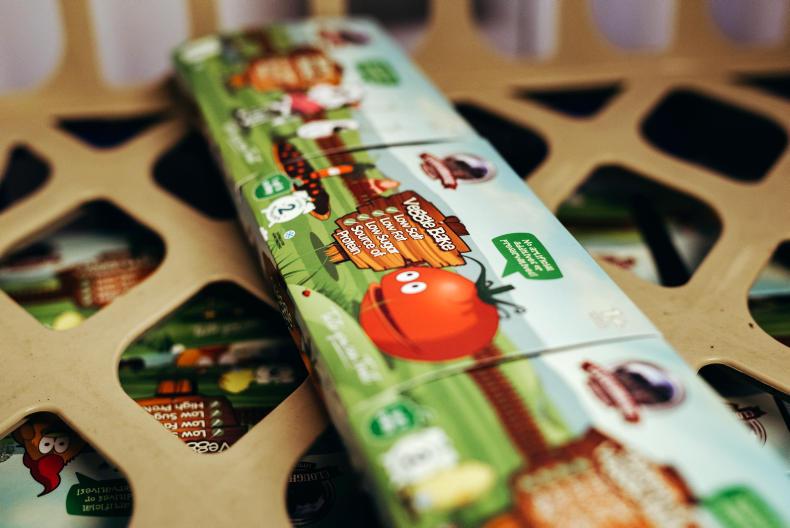
So what’s the secret to success?
“It was very much good honest cooking, no fancy additives and that’s still the way it is to this day.
“We weren’t going for cheap and cheerful because there’s plenty of that out there. We were and we are still a little more expensive.
“Obviously then you have to market the reasons for that,” says Lorna.
“The reason is: even now we have started a children’s range and my wee grandkids come and I would say, ‘Come on we’ll go out to the shop and pick whatever meal you want’.
“You’re not going to feed your grandkids something that’s not 100% perfect.”
The winds of change
Clearly, change is not something Lorna – or indeed any of her family – are afraid of. On-farm now they have 100 sheep, 80 beef cattle and 14,500 free-range hens.
In the past four years with the abolition of milk quotas Robert has also gotten into dairying, something he wanted to do since his childhood.
He has 140 dairy cows, milked by a two-unit robot.
Richard, Lorna and Sam’s other son, studied environmental science at university. It was his influence that saw a number of windmills erected on their land, now used to power the operation.
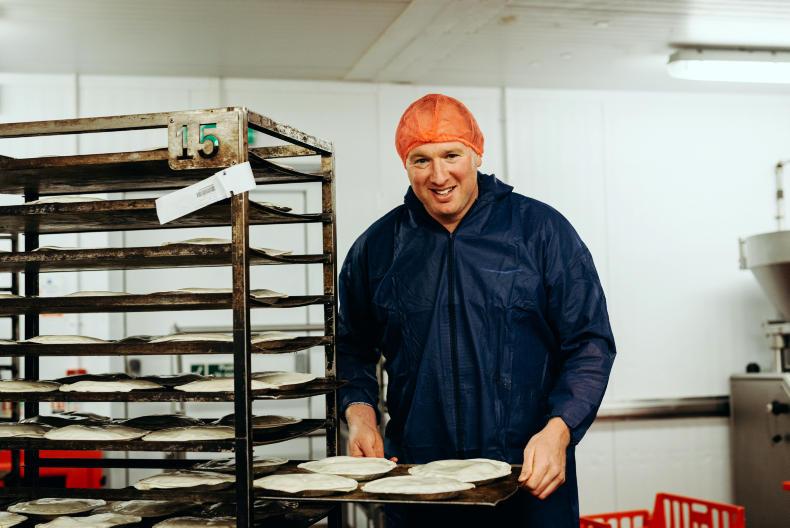
Robert taking Irish Country Living though the process of making the pies. \ Sarah Fyffe
Also on the change side of things, in the past year Cloughbane has launched a line of vegetarian ready meals. Lorna believes the only way forward in terms of diet, is for vegetarians, vegans and farmers to respect each other.
“I don’t think we have to fight each other, I think there’s a place for both as long as we respect other people’s opinions.
Farmers do love their animals and that needs to be respected
“Coming from a farm, I remember one time on Facebook someone putting up something derogatory about farmers. I wrote back saying my husband and son spent half the night sitting up with a sick calf.
“Farmers do love their animals and that needs to be respected. Also, meat eaters should respect if people want to be vegetarian or vegan.
“Again, it’s about respect and co-operation not going into attack mode.”
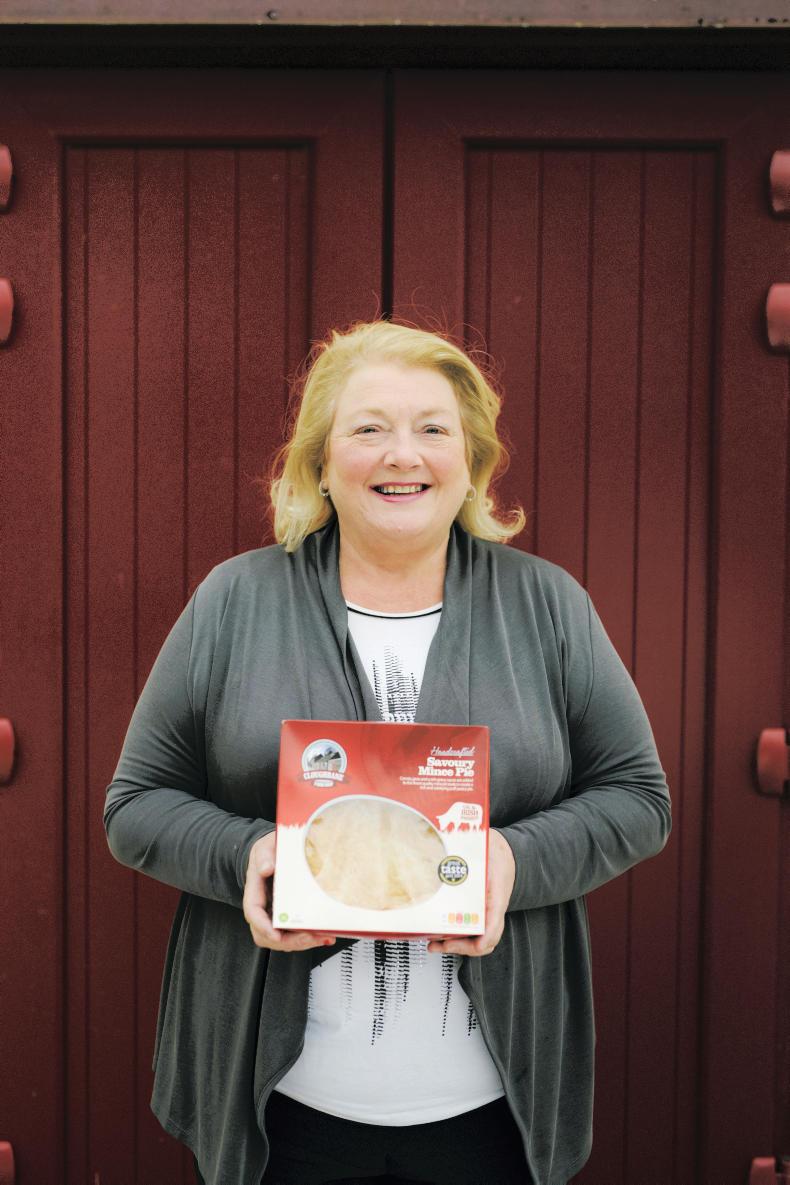
Lorna Robinson of Cloughbane Farmshop. \ Sarah Fyffe
Like most, Cloughbane Farmshop is seeing an increasing amount of online orders and deliveries as opposed to in-shop sales.
In line with this, the shop is now open only on Thursdays and Fridays.
You have to change, you have to be ready
“That’s just the way the market is developing. There’s no point in putting your head in the sand and saying, ‘We always did it this way so it’s not going to change’.
“You have to change, you have to be ready. If you do what you always did, everything else will change around you and you’ll just get left behind.”
Although there’s change a plenty happening, Cloughbane is firmly rooted in farming tradition: bringing people quality food.
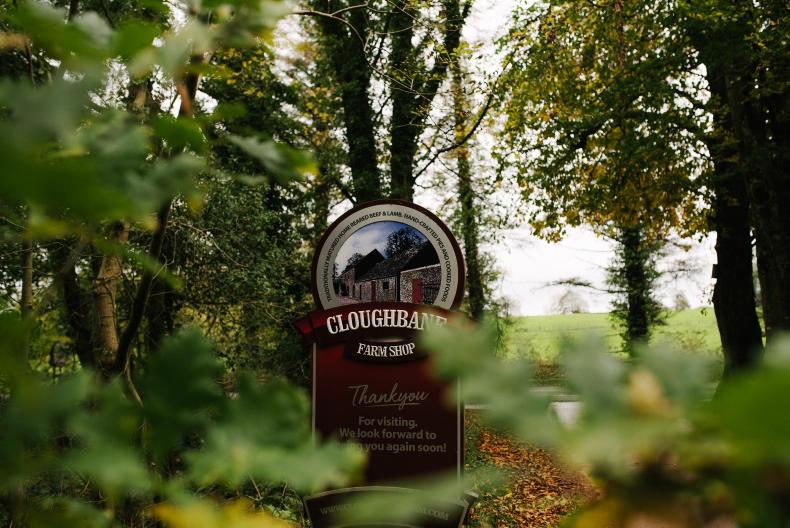
Cloughbane Farmshop. \ Sarah Fyffe
Selling to both sides of the border and the UK, Cloughbane Farmshop is a good example of a business affected by both Brexit and the Northern Ireland Assembly in Stormont not sitting.
Lorna says the uncertainty surrounding Brexit is having “a very detrimental effect” as they’re not getting any new business.
“It’s definitely affecting a lot of agri-food businesses.”
Cloughbane also has a greenfield site on their land passed for planning permission, where they intend to build a new processing operation. However, this is being held up by Stormont not sitting for the last three years, as they can’t access grants available for companies to expand.
Read more
Marching to her own beet
Meet the woman who hatched her egg business, starting with just 10 hens
Travelling up the lane and into the yard, from a quick assessment there’s no reason to think Cloughbane is anything other than a regular family farm.
It’s only the signs and a small carpark that give the game away.
You see, as well as being a working family farm, Cloughbane has a couple more strings to its bow. Namely, a farm shop selling their meat and also a pre-packed pie and ready meal range.

Robert, Lorna and Sam Robinson. \ Sarah Fyffe
The yard is lined with both yellow and stone farm buildings. On one side the yellow front makes up the farm shop, converted from a sheep shed.
Behind the stone is a whole processing unit for the ready meals, this was once a byer.
The family behind this enterprise is the Robinsons. Husband-and-wife team Sam and Lorna started up the business and now their sons Robert and Richard are also very involved. Lorna is the managing director and from a mixed farm herself. She and Sam met through the Young Farmers’ Clubs of Ulster (YFCU).
I previously had a job in sales, so again I was able to use a lot of that as this business grew
Located between Cookstown and Dungannon in Co Tyrone, Cloughbane Farmshop is on Sam’s home farm. Prior to diversifying they had 700 sheep, beef cattle and free-range hens.
At this time, as well as working on farm, Lorna was doing a degree in marketing and finance.
“I previously had a job in sales, so again I was able to use a lot of that as this business grew,” says Lorna.
“Just over 20 years ago, I was ill and I was out of work. I had a serious illness for a while and I kind of lost my nerve about going back into sales.

“At the time when this all started up I was working on the farm full time with the hens and I was helping out with everything else.”
In 2002, Lorna was asked if the family would become founding members of Dungannon Farmers’ Market. This might have appeared to be a small step at the time, but it turned out to be the catalyst for what’s now an international agri food business.
As the farmers’ market grew, so did Lorna’s confidence. She was involved in a lot of the promotion for the market, for example doing write-ups for the paper, on which she received great feedback.
Initially we didn’t even think of a farm shop, we just wanted a cutting room
At the once monthly market the Robinsons sold beef and lamb from their farm which was slaughtered in a local abattoir. This proved popular with customers, who wanted to buy their meat more often. 
“Initially we didn’t even think of a farm shop, we just wanted a cutting room. We were buying secondhand equipment from a local butcher. He had this stuff in his garage and said, ‘Lorna, there’s a wee serve-over.
“It’s only going to sit there until it rots, take it away if it’s any good to ye’. We asked the environmental health officer (EHO) could we open a shop here? He said, ‘Look, you have all the standards necessary’.
“At the farmers’ market we handed out leaflets saying we are now open on Thursday, Friday and Saturday. Initially the butcher would come, bone-down the whole animal and put labels on the meat.
“I would come out and serve the customers. We would have had frying steak and braising steak.
“I often wonder did people take the wrong thing home when the label fell off,” laughs Lorna of her first foray in retail.
Expansion on the horizon
The farm shop proved to be busy and by 2006 was open full time. However, there was one small issue, it was really only the premium cuts customers were buying.
“Our unique selling point was 28 days matured beef, because of that people were coming from far and wide to buy steaks and the more expensive cuts.
“We were left with a lot of the cheaper cuts, but the lovely ones, that if they’re slow cooked, are full of flavour.

“We thought, what are we going to do with this? So I literally started to make some pies in our kitchen [their house is in the same yard as the shop] and sold them in the farm shop. Then local stores came and said, ‘Can you do this for us?’ Really, that was how the cooked food end of it was born.”
As the cooked range began to expand into ready meals such as cottage pies and beef dinners, it became unsustainable to only use meat from the Robinsons’ farm. Now they buy in beef from Ireland and the UK.
In and around 2008 they started selling these meals in supermarkets. Now they’re stocked in Asda, Sainsbury’s, Tesco and SuperValu to name but a few.
Interestingly, Lorna credits the Balmoral Show as the platform where the supermarkets initially became aware of their products.

“Seeing our stuff on supermarket shelves was totally amazing, because not in a million years if you had asked me 20 years ago would I have thought it was possible. It was all so unintentional.”
The sauces used in the meals are made from scratch. The only thing bought in is pastry from Dublin.
Lorna’s son Robert gives us a tour of the processing unit as people are busy at work. Across the business they now employ about 50 staff.
We follow the pies from raw ingredients to cooking the meat and vegetable filling in huge vats to baking and packaging. Along the way, we change into various colour-coordinated suits, shoes and hair nets – don’t forget the hand sanitising – as Robert seriously stresses the importance of these quality controls.
Chatting to Lorna afterwards in one of their converted farm building offices, there are a whole host of awards hung on the wall behind her. From Great Taste (they got three stars for their fillet steak) to agri food business of the year and more. 
So what’s the secret to success?
“It was very much good honest cooking, no fancy additives and that’s still the way it is to this day.
“We weren’t going for cheap and cheerful because there’s plenty of that out there. We were and we are still a little more expensive.
“Obviously then you have to market the reasons for that,” says Lorna.
“The reason is: even now we have started a children’s range and my wee grandkids come and I would say, ‘Come on we’ll go out to the shop and pick whatever meal you want’.
“You’re not going to feed your grandkids something that’s not 100% perfect.”
The winds of change
Clearly, change is not something Lorna – or indeed any of her family – are afraid of. On-farm now they have 100 sheep, 80 beef cattle and 14,500 free-range hens.
In the past four years with the abolition of milk quotas Robert has also gotten into dairying, something he wanted to do since his childhood.
He has 140 dairy cows, milked by a two-unit robot.
Richard, Lorna and Sam’s other son, studied environmental science at university. It was his influence that saw a number of windmills erected on their land, now used to power the operation.

Robert taking Irish Country Living though the process of making the pies. \ Sarah Fyffe
Also on the change side of things, in the past year Cloughbane has launched a line of vegetarian ready meals. Lorna believes the only way forward in terms of diet, is for vegetarians, vegans and farmers to respect each other.
“I don’t think we have to fight each other, I think there’s a place for both as long as we respect other people’s opinions.
Farmers do love their animals and that needs to be respected
“Coming from a farm, I remember one time on Facebook someone putting up something derogatory about farmers. I wrote back saying my husband and son spent half the night sitting up with a sick calf.
“Farmers do love their animals and that needs to be respected. Also, meat eaters should respect if people want to be vegetarian or vegan.
“Again, it’s about respect and co-operation not going into attack mode.”

Lorna Robinson of Cloughbane Farmshop. \ Sarah Fyffe
Like most, Cloughbane Farmshop is seeing an increasing amount of online orders and deliveries as opposed to in-shop sales.
In line with this, the shop is now open only on Thursdays and Fridays.
You have to change, you have to be ready
“That’s just the way the market is developing. There’s no point in putting your head in the sand and saying, ‘We always did it this way so it’s not going to change’.
“You have to change, you have to be ready. If you do what you always did, everything else will change around you and you’ll just get left behind.”
Although there’s change a plenty happening, Cloughbane is firmly rooted in farming tradition: bringing people quality food.

Cloughbane Farmshop. \ Sarah Fyffe
Selling to both sides of the border and the UK, Cloughbane Farmshop is a good example of a business affected by both Brexit and the Northern Ireland Assembly in Stormont not sitting.
Lorna says the uncertainty surrounding Brexit is having “a very detrimental effect” as they’re not getting any new business.
“It’s definitely affecting a lot of agri-food businesses.”
Cloughbane also has a greenfield site on their land passed for planning permission, where they intend to build a new processing operation. However, this is being held up by Stormont not sitting for the last three years, as they can’t access grants available for companies to expand.
Read more
Marching to her own beet
Meet the woman who hatched her egg business, starting with just 10 hens













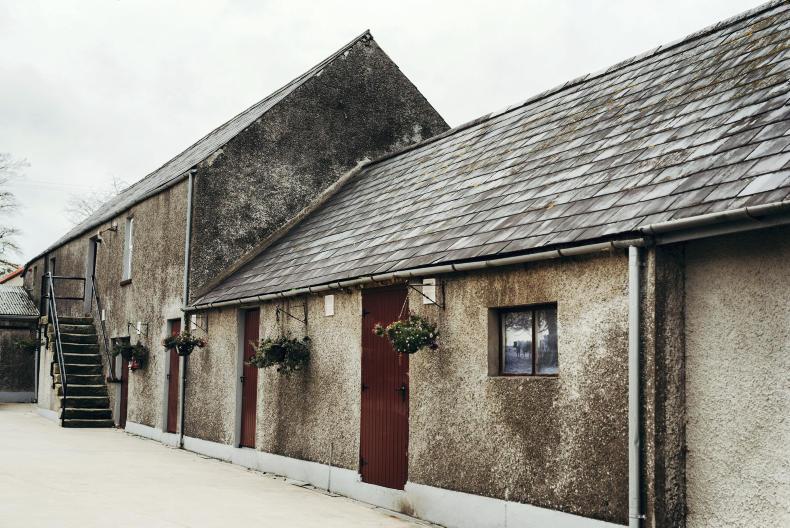




SHARING OPTIONS